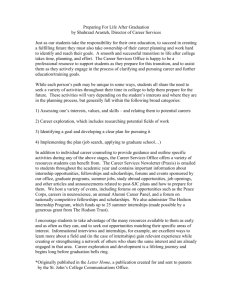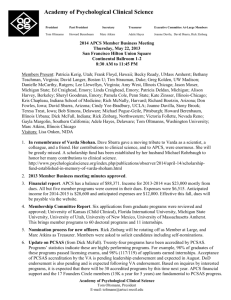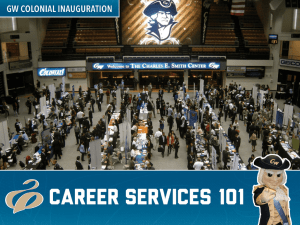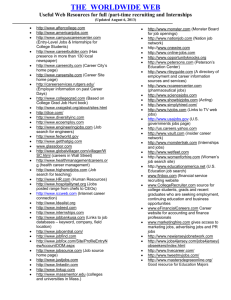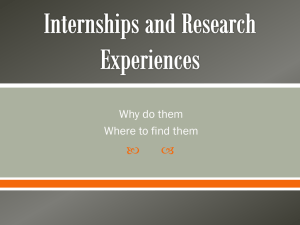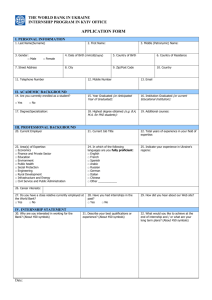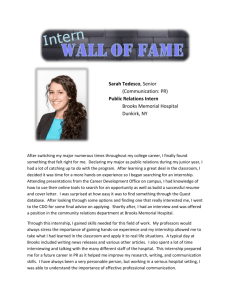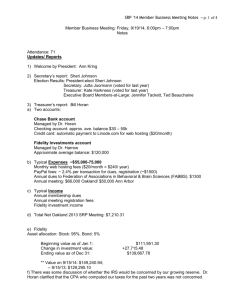here - The Academy of Psychological Clinical Science
advertisement
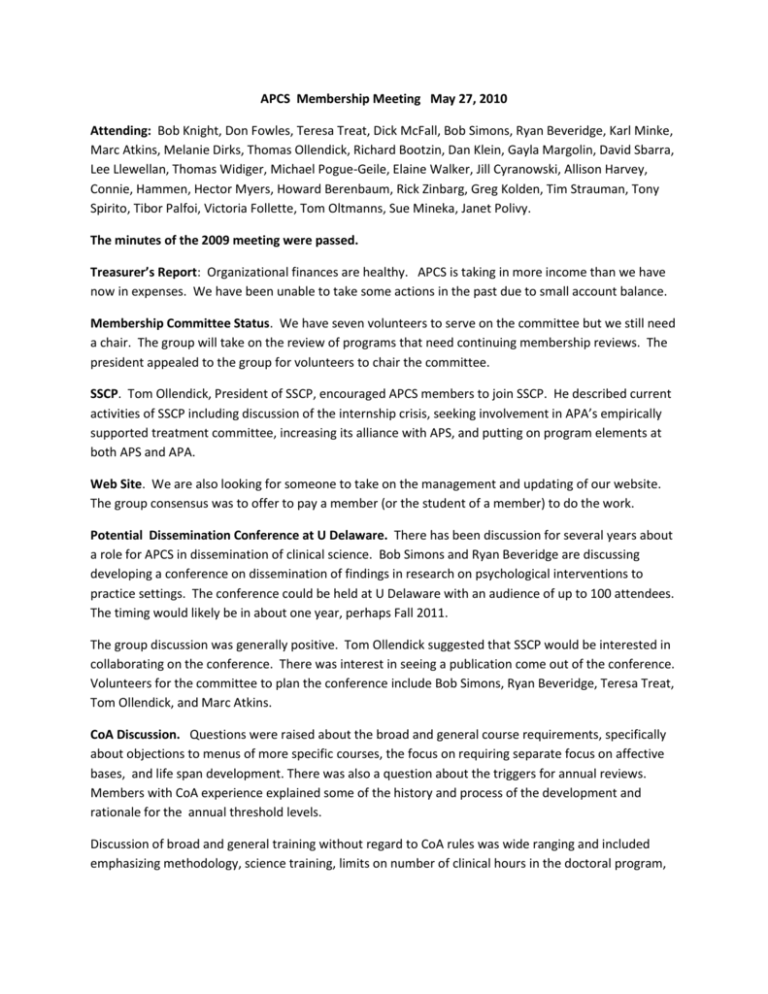
APCS Membership Meeting May 27, 2010 Attending: Bob Knight, Don Fowles, Teresa Treat, Dick McFall, Bob Simons, Ryan Beveridge, Karl Minke, Marc Atkins, Melanie Dirks, Thomas Ollendick, Richard Bootzin, Dan Klein, Gayla Margolin, David Sbarra, Lee Llewellan, Thomas Widiger, Michael Pogue-Geile, Elaine Walker, Jill Cyranowski, Allison Harvey, Connie, Hammen, Hector Myers, Howard Berenbaum, Rick Zinbarg, Greg Kolden, Tim Strauman, Tony Spirito, Tibor Palfoi, Victoria Follette, Tom Oltmanns, Sue Mineka, Janet Polivy. The minutes of the 2009 meeting were passed. Treasurer’s Report: Organizational finances are healthy. APCS is taking in more income than we have now in expenses. We have been unable to take some actions in the past due to small account balance. Membership Committee Status. We have seven volunteers to serve on the committee but we still need a chair. The group will take on the review of programs that need continuing membership reviews. The president appealed to the group for volunteers to chair the committee. SSCP. Tom Ollendick, President of SSCP, encouraged APCS members to join SSCP. He described current activities of SSCP including discussion of the internship crisis, seeking involvement in APA’s empirically supported treatment committee, increasing its alliance with APS, and putting on program elements at both APS and APA. Web Site. We are also looking for someone to take on the management and updating of our website. The group consensus was to offer to pay a member (or the student of a member) to do the work. Potential Dissemination Conference at U Delaware. There has been discussion for several years about a role for APCS in dissemination of clinical science. Bob Simons and Ryan Beveridge are discussing developing a conference on dissemination of findings in research on psychological interventions to practice settings. The conference could be held at U Delaware with an audience of up to 100 attendees. The timing would likely be in about one year, perhaps Fall 2011. The group discussion was generally positive. Tom Ollendick suggested that SSCP would be interested in collaborating on the conference. There was interest in seeing a publication come out of the conference. Volunteers for the committee to plan the conference include Bob Simons, Ryan Beveridge, Teresa Treat, Tom Ollendick, and Marc Atkins. CoA Discussion. Questions were raised about the broad and general course requirements, specifically about objections to menus of more specific courses, the focus on requiring separate focus on affective bases, and life span development. There was also a question about the triggers for annual reviews. Members with CoA experience explained some of the history and process of the development and rationale for the annual threshold levels. Discussion of broad and general training without regard to CoA rules was wide ranging and included emphasizing methodology, science training, limits on number of clinical hours in the doctoral program, rejecting any focus on credit units, contact hours etc., accepting specialized courses, core knowledge expectations for clinical scientists, acquiring much or all of that core knowledge in undergraduate years. Alternative ways of meeting broad and general requirements were then discussed. These included the Arizona/McGill portfolio system in which classes and directed readings that in combination meet the breadth areas. Other options included diffusions of content across courses, reading lists with tests, courses that are smaller than full semester/quarter classes. PCSAS update. Three programs are now accredited by PCSAS: Illinois, Arizona, and Washington U in St Louis. Three more are deemed eligible to apply: McGill, SUNY Stony Brook, Northwestern. There are five more programs that have indicated plans to apply in 2010-11 year. 13 programs have pledged as members of the Founder’s Circle. There is also funding from the Dana Foundation and from individual donations of different amounts. PCSAS is a 501c3 nonprofit so contributions are tax deductible. The process for PCSAS accreditation is as follows: The emphasis is on outcomes rather than inputs. Success in training clinical scientist over the past 10 years is examined. Programs submit a letter of intent with a legal document that assures PCSAS that the program will not sue in case of adverse decision. The letter of intent is sent with a $1000 check which counts toward the review fee if the program is eligible to apply. There is no refund for programs deemed ineligible. The package includes the equivalent of a CV on all grads over the past 10 years. The CVs need to include description of what students do in their positions. The program then explains how each student does or does not count as a clinical scientist. PCSAS expects that a majority of graduates will be clinical scientists. PCSAS also wants to see the admission data for the program in order to see if input data is linked to success of students. There is also a request for program philosophy, structure, faculty etc. Programs are expected to cover in some manner psychopathology, measurement, and intervention. Faculty CVs are also submitted. Reviews panel consist of three members, one of whom is also a member of the two person site visit team. The other two members’ identities are confidential. After the site visit, the program can respond to the report’s accuracy, not the interpretation of facts. The Baker et al. paper attracted widespread attention and brought attention to PCSAS and the Academy. PCSAS has been meeting with CHEA to develop the application for CHEA for recognition. The application to be deemed eligible was submitted May 22. The approval of eligibility will be reviewed in June. If deemed eligible, the application for recognition could be submitted in Fall. It generally takes approximately 18 to 24 months to achieve recognition by CHEA as an accrediting body. Internship Survey. At least for the 35 programs responding, our programs are doing well in the internship match with an average of about one student per program per year not placing on Match Day and about half a student on average placing in Clearinghouse in accredited programs. Most students and programs identify themselves as clinical science in whole or in part during the match process. Suggestions from the survey and the EC included: APCS developing small affiliated internships and exchanging students among them; surveying students of member programs about the science orientation of the internships that they attend; do our very research-career-oriented students need to do internships? Finally, the most commonly cited reason for failure to match was geographic limitation. The point was made that students also restrict geographic options in the ranking process as well as in the application process. There was discussion about how to develop and present data to students to discourage the steady increase in practicum hours over the years. Internship members pointed out the importance of the match between the student’s interests and the programs interests rather than hours and other quantitative factors. It was suggested that we survey our students soon after Match to see what range of hours, publications, and other factors that may influence the match process. It was also suggested that we survey the doctoral programs to get a sense of what the minimum number of hours are to be successful in the Match. It was noted that SSCP is also planning similar survey and we should coordinate with them. The question was raised as to why internship slots are increasingly being fractionated into specialized slots (e.g., child, aging, autism, etc.) rather than a set of general slots. There was wide-ranging discussion of how to assess and communicate clinical competencies between doctoral programs and internships. Internships are very interested in clinical competency profiles and specific match of interests. There appeared to be no clear methods on either side to assess clinical competency at this point in time. Tim suggested we think of a possible white paper on the doctoral program to internship coordination. This discussion then led into conversation about increasing outreach to science-oriented internships to increase the number of internship programs in APCS. More content-oriented meetings would be a useful step in recruitment of programs. It was also suggested that finding out if there are more clinical science grad students attending APS, it would be a good opportunity for internships to recruit those students, an incentive for internships to join and attend.

